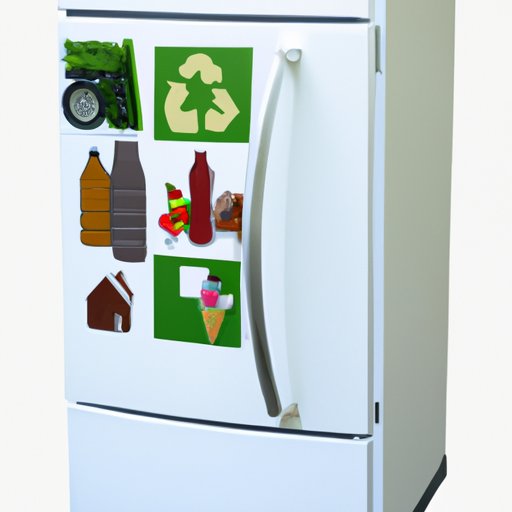Introduction
With so many appliances in our homes, it’s easy for one to slip through the cracks when it comes to proper disposal. When it’s time to replace an old refrigerator, it’s important to consider the environmental impact of disposing of it responsibly. This article will explore where to recycle a refrigerator and what can be done with it afterward.
How to Identify a Recycling Center That Accepts Refrigerators
The first step in recycling a refrigerator is identifying a local center that accepts them. There are a few resources available to help you do this:
Local Resources
The easiest way to find a local recycling center that accepts refrigerators is to check with your local government or waste management company. Many cities have designated drop-off centers for large appliances and hazardous waste. Additionally, some local retailers may also accept refrigerators for recycling.
Online Resources
If you don’t have any luck locally, there are several online resources that can help you locate a recycling center in your area. Earth911 has a searchable database of recycling centers and can help you find one near you. Additionally, sites like 1-800-Recycling and Call2Recycle have searchable databases as well.

Tips for Safely Disposing of a Refrigerator
Once you’ve identified a recycling center that accepts refrigerators, it’s important to ensure it’s handled properly. Here are a few tips to keep in mind:
Proper Handling
Before transporting a refrigerator to a recycling center, make sure all doors, drawers, and shelves are securely closed. Additionally, remove any food, liquids, and other items from inside the fridge. If possible, use a dolly or other moving device to transport it safely.
Transportation
The safest way to transport a refrigerator is on its side or back. Never drive with the refrigerator upright, as this can cause damage to the internal components. Additionally, make sure the refrigerator is secured and won’t move during transit.
Benefits of Recycling Old Refrigerators
Recycling an old refrigerator can have several benefits, both financial and environmental. Here are a few to consider:
Financial Savings
Recycling an old refrigerator can save you money. Depending on your location, you may be eligible for tax credits or rebates for recycling an old appliance. Additionally, many recycling centers will pay for certain materials, such as copper and aluminum, which can offset the cost of recycling.
Environmental Impact
Recycling an old refrigerator can also have a positive impact on the environment. By recycling, you are reducing the amount of waste going into landfills and preventing pollution from harmful chemicals. Additionally, recycling can conserve natural resources and reduce energy consumption.
The Environmental Impact of Not Recycling Refrigerators
Not recycling an old refrigerator can have a detrimental effect on the environment. Here are a few of the potential consequences:
Pollution
When a refrigerator is not recycled properly, it can release dangerous pollutants into the air and water. These pollutants can include mercury, lead, and other toxins. In addition, improper disposal can contribute to global warming and climate change.
Waste
In addition to releasing pollutants, not recycling a refrigerator can contribute to unnecessary waste. Appliances contain a variety of materials, including plastic, metal, and glass, which could potentially be reused or recycled if disposed of properly.

An Overview of the Refrigerator Recycling Process
Once a refrigerator has been dropped off at a recycling center, it goes through a few steps before being repurposed or discarded. Here’s an overview of the process:
Separating Parts
The first step in the recycling process is separating the different parts of the refrigerator. This includes removing the compressor, condenser, and other components. The materials are then sorted into different categories based on their composition.
Recycling Materials
Once the materials are separated, they are sent to a facility to be recycled. Depending on the material, it may be melted down and reused for new products or sold for scrap. Any remaining materials are typically sent to a landfill.

What Can Be Done With Recycled Refrigerators
Once a refrigerator has been recycled, there are a few options for what can be done with it. Here are a few ideas:
Repurpose Parts
Many of the parts from a recycled refrigerator can be reused. The compressor, for example, can be used to create a vacuum cleaner or other small appliance. Additionally, the insulation can be used for crafts or home improvement projects.
Donate or Sell
If the refrigerator is still in good condition, it may be possible to donate or sell it. Many charities and organizations accept donations of gently used appliances. You can also try selling it online or through classified ads.
Conclusion
When it’s time to replace an old refrigerator, it’s important to consider the environmental impact of disposing of it responsibly. This article has explored where to recycle your refrigerator and what can be done with it afterward. Recycling an old refrigerator can have numerous benefits, both financial and environmental, and can help reduce waste and pollution.
Summary
Recycling an old refrigerator is important for both financial and environmental reasons. Finding a local recycling center that accepts refrigerators is the first step. Additionally, it’s important to handle and transport the refrigerator safely. Once it’s been recycled, there are a few options for what can be done with it, such as repurposing parts or donating or selling it.
Call to Action
If you’re looking to replace an old refrigerator, now is the time to start researching local recycling centers and potential donation or selling options. By disposing of it responsibly, you can help reduce waste and pollution and potentially save money in the process.


